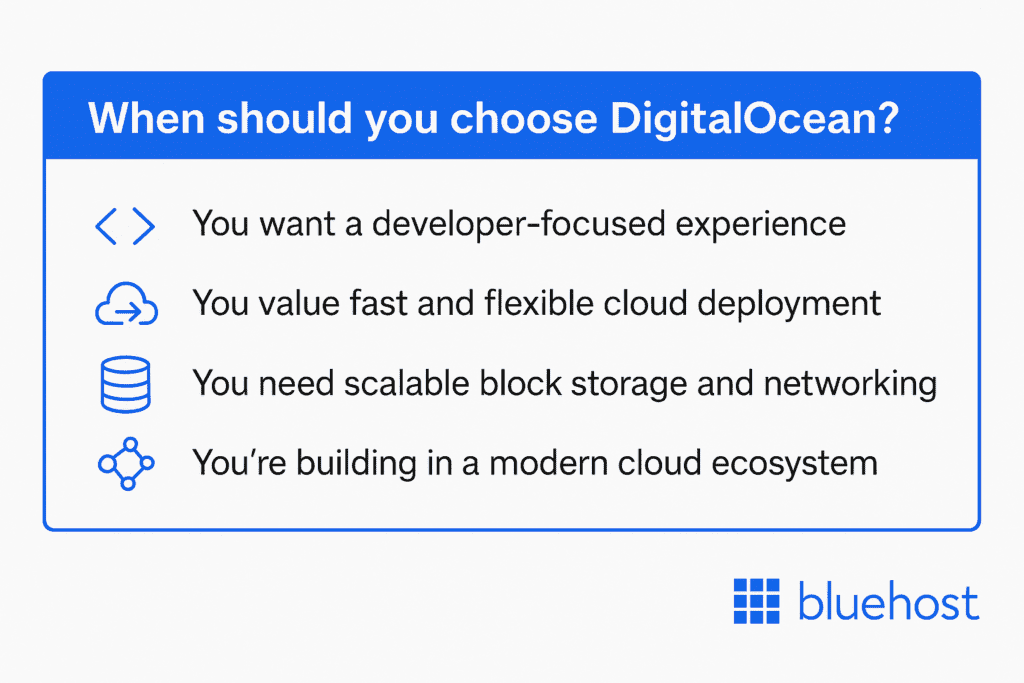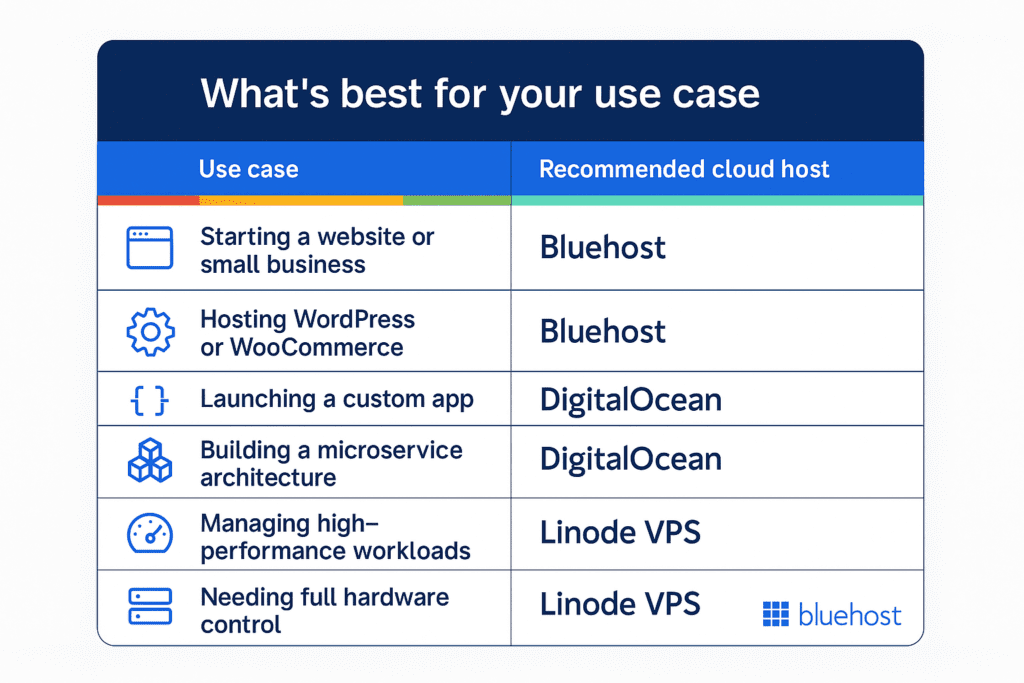Key highlights
- Know how DigitalOcean vs Linode VPS compares on key metrics like developer tools, scalability and cost-effectiveness.
- Understand the pros and cons of DigitalOcean vs Bluehost to see which platform better suits your technical skills and support needs.
- Learn which provider offers the most beginner-friendly tools and support for hassle-free website management.
- Explore real user ratings, performance benchmarks and data center reach to make a fully informed hosting decision.
- Uncover why Bluehost is a top pick for businesses and creators looking for simplicity, support and scalable cloud hosting services.
Torn between DigitalOcean, Linode VPS and Bluehost for your next cloud project? You’re not alone!
In the world of cloud computing, cloud hosting combined with virtual private servers (VPS) offer the perfect balance of performance, control and flexibility. But with so many options, how do you choose the one that fits your goals? Do you go with the developer-friendly interface of DigitalOcean, the performance-driven power of Linode VPS or the all-in-one convenience and support of Bluehost?
This guide dives deep into the key differences between the top cloud providers: DigitalOcean, Linode VPS and Bluehost. It covers everything from cloud hosting services and cloud solutions to pricing, reliability and ease of use. Let’s dive in!
TL;DR – Bluehost vs DigitalOcean vs Linode
- Bluehost: Best for beginners, small businesses & creators. Offers managed support, pre-installed CMS, CDN and 24/7 live support.
- DigitalOcean: Best for developers and startups. Ideal for custom deployments, API access and scalable workloads.
- Linode: Best for experienced teams. Offers raw performance and transparent pricing but requires manual setup.
DigitalOcean vs Linode VPS vs Bluehost: A comprehensive comparison
Choosing the right cloud services provider can be challenging with so many options available. This comparison of DigitalOcean vs Linode VPS vs Bluehost breaks down key features/parameters to help you decide which platform best fits your needs:
1. Ease of use
| Feature | DigitalOcean | Linode | Bluehost |
|---|---|---|---|
| User interface | Developer-centric, requires CLI/API | Minimal UI, geared toward developers | Beginner-friendly, intuitive dashboard |
| Setup process | Manual setup (via Droplets) | Manual setup with StackScripts | One-click installs, guided setup |
| Managed services | Optional via add-ons | Optional via Linode Professional Services | Included with most cloud plans |
| Documentation quality | Extensive but developer-focused | Technical, concise | User-friendly, includes tutorials |
DigitalOcean: Developer-first usability
DigitalOcean’s strength lies in its Droplets, which are cloud-based VPS instances. They are lightweight and flexible, making them excellent for custom setups. Ideal for those familiar with the command line or seeking a developer-friendly cloud hosting experience.
Linode: Clean UI with a technical tilt
Linode, now part of Akamai, offers cloud hosting with similar flexibility to DigitalOcean, including barebones cloud host benchmarking features. Its interface is fast and functional but remains primarily built for developers.
Bluehost: Simplified cloud hosting with managed support
Bluehost stands out for ease of use in the cloud space. With automated provisioning, built-in tools like cPanel and WHM and optional managed cloud hosting, it’s designed for users who prefer to avoid managing every technical detail. The Bluehost control panel is intuitive, making it a popular option for non-developers.
Verdict: Bluehost wins for ease of use, thanks to its beginner-friendly dashboard and managed support. DigitalOcean and Linode are more suited for developers who prefer full control and command-line setups.
2. Pricing
| Provider | Starting cloud price | Free tier | Billing options | |
| DigitalOcean | $4/month (Basic Droplet) | Yes (limited credits) | Hourly & monthly billing | |
| Linode | $5/month (1GB plan) | No true free tier | Hourly & monthly billing | |
| Bluehost | $75.00/month (Standard Cloud) | No free cloud tier | Monthly & annual billing |
DigitalOcean: Budget-friendly for devs
DigitalOcean’s pricing starts at just $4/month, making it one of the most cost effective cloud hosting providers for developers. It also supports hourly billing, so you only pay for what you use.
Linode’s pricing: Similar pricing, fewer freebies
Linode’s entry-level cloud plan starts at $5/month, with comparable specs to DigitalOcean. It doesn’t offer a free tier but remains competitively priced for developers who prefer a DIY setup.
Bluehost: Higher cost, but more bundled features
Bluehost’s cloud plans begin at $29.99/month. While pricier than DigitalOcean or Linode, it includes managed support, a user-friendly dashboard, free SSL and 24/7 customer service. It offers more value for non-technical users who need full-service cloud hosting.
Verdict: DigitalOcean offers the lowest entry point, ideal for developers on a budget. Bluehost is a bit more expensive but worth it for users who want a managed experience with added features.
3. CMS support
| Feature | DigitalOcean | Linode | Bluehost |
|---|---|---|---|
| Pre-installed CMS options | No – manual install required | No – manual install required | Yes – WordPress & others pre-installed |
| One-click CMS deployment | Via Marketplace (For example, WordPress, Ghost) | Via Marketplace or StackScripts | Built-in one-click WordPress & CMS installs |
| Managed CMS support | Limited (requires manual updates) | Limited (self-managed) | Fully managed WordPress support |
| Kubernetes CMS deployment | Possible with Managed Kubernetes | Possible with DIY K8s setup | Not applicable |
| Security features for CMS | Customizable firewalls, automatic backups | Manual setup, optional tools | Auto-updates, SSL, automatic backups, malware scan |
DigitalOcean: Developer-first CMS hosting
DigitalOcean offers flexibility for installing any CMS via its marketplace or manually. Ideal for developers who prefer full control, but requires more setup time. It also supports Kubernetes deployment for scalable CMS hosting.
Linode: Do-it-yourself CMS support
Linode offers similar CMS support, with installations either done manually or via StackScripts. It’s equally flexible, but Linode’s setup requires more technical knowledge and doesn’t include automatic updates or security features.
Bluehost: Optimized for WordPress & managed CMS
Bluehost shines for CMS hosting and is also officially recommended by one of the most used CMS WordPress. It comes pre-installed, optimized and fully managed, with automatic updates, SSL, backups and malware scanning included. Bluehost handles all the technical details, allowing users to focus on content creation rather than server configurations.
Verdict: Bluehost wins for CMS support, with pre-installed, fully managed WordPress hosting. DigitalOcean and Linode are more flexible but require manual setups and are not as beginner friendly.
4. Bandwidth
| Feature | DigitalOcean | Linode | Bluehost |
|---|---|---|---|
| Bandwidth limits | Generous tiers (starting at 1TB) | Generous tiers (starting at 1TB) | Unmetered on most plans |
| Scaling options | Easily upgradable | Easily scalable | Scale via plan upgrade |
| Ideal for | Apps with predictable traffic | Projects with steady bandwidth needs | Websites expecting traffic spikes |
DigitalOcean or Linode: Generous, but capped
Both platforms offer bandwidth starting from 1TB with every cloud instance. While scaling is possible, exceeding your bandwidth cap incurs extra charges. This setup works well for predictable usage but requires monitoring to avoid surprises.
Bluehost: Unmetered bandwidth for peace of mind
Bluehost offers unmetered bandwidth, which means you don’t have to worry about overage fees. This feature is especially helpful for sites with fluctuating traffic. Bluehost’s cloud hosting is ideal for businesses and websites that require consistent performance without unexpected charges.
Verdict: Bluehost wins with unmetered bandwidth, offering peace of mind without extra fees. DigitalOcean and Linode provide scalable bandwidth but may incur extra costs if limits are exceeded.
Also read: Difference between Unmetered Bandwidth & Unlimited Bandwidth
5. Storage
| Feature | DigitalOcean | Linode | Bluehost |
|---|---|---|---|
| Default storage type | SSD (High-performance NVMe on newer plans) | SSD (NVMe on select plans) | SSD on all plans |
| Base storage size | Starts at 25GB | Starts at 25GB | Starts at 30GB (Cloud) |
| Expandable storage | Yes – attach volumes | Yes – block storage | Limited – requires plan upgrade |
| Performance tuning | Full control via CLI | Developer-level control | Limited customization |
DigitalOcean: Developer-centric with scalable volumes
DigitalOcean offers SSD storage by default, with fast NVMe support on newer plans. You can easily attach additional volumes as needed and control disk performance at the OS level. DigitalOcean offers flexibility and scalability, ideal for performance-focused use cases.
Linode: Similar power, slightly more manual
Linode mirrors DigitalOcean with SSD-based storage and NVMe upgrades on newer instances. You can expand storage using block storage and configure everything down to the disk level. In the digitalocean vs linode vps comparison, they’re nearly identical for storage flexibility.
Bluehost: Simpler but less flexible
Bluehost provides SSD storage on all hosting plans, inincluding cloud, but it’s less customizable compared to DigitalOcean and Linode. Storage upgrades require a plan upgrade rather than on-the-fly scaling.
Verdict: DigitalOcean and Linode win on storage flexibility with attachable volumes and fine-tuned control. Bluehost offers solid SSD performance, but less customization and no on-the-fly scalability
Also read: Bluehost Cloud Hosting Storage
6. Site speed
| Feature | DigitalOcean | Linode | Bluehost |
|---|---|---|---|
| Performance hardware | SSD/NVMe, Intel/AMD CPUs | SSD/NVMe, Intel/AMD CPUs | SSD, custom tech stack |
| Data center locations | Global (8+ regions) | Global (11+ locations) | Global CDN + US/EU servers |
| CDN integration | Manual setup (Cloudflare etc.) | Manual setup | Built-in with Cloudflare CDN |
| Caching & optimization | Custom setup via CLI | DIY with config scripts | Built-in caching, HTTP/2, PHP-FPM |
DigitalOcean: Raw power, dev-optimized
DigitalOcean is known for developer-friendly hosting with access to high-speed SSDs, NVMe drives and modern CPUs. You can optimize performance manually using server-side tools and tuning.
Linode: High performance, but DIY
Linode delivers excellent performance but leaves caching, CDN and compression setups to you. This flexibility appeals to system admins but can overwhelm beginners.
Bluehost: Speed with simplicity
Bluehost includes speed optimizations by default—built-in caching, PHP-FPM, Cloudflare CDN and NGINX-based architecture. This matters for small business owners, bloggers or eCommerce sites who want cloud hosting provider-grade speed with none of the complexity.
Verdict: Bluehost wins for ease + speed, delivering great performance with no setup needed. DigitalOcean and Linode are faster in expert hands—but require tuning and technical skill.
Also read: Website Speed: 5 Ways To Fix Your Website Speed
7. User rating
| Platform | User rating | Highlights |
|---|---|---|
| DigitalOcean | 4.5/5 | Loved by developers for control, API and pricing |
| Linode | 3.4/5 | Reliable for tech-savvy users, strong support |
| Bluehost | 4.3/5 | Praised for ease of use, WordPress support and uptime |
DigitalOcean: Developer favorite
DigitalOcean consistently earns high ratings from tech-savvy users who value control, scalability and its clean UI. It’s especially popular for those focused on API access, managed Kubernetes and custom deployments.
Linode: Strong but niche
Linode trails behind both in popularity but scores well for reliability and support. While both DigitalOcean and Linode attract similar audiences, Linode users tend to appreciate its focus on transparency and performance.
Bluehost: Great for all users
Bluehost stands out in reviews from non-developers. Users praise our intuitive dashboard, built-in security features and WordPress tools—factors that often matter more than raw performance in the digitalocean vs Bluehost comparison.
Verdict: Bluehost wins over everyday users with simplicity and support. Linode remains a solid middle-ground option and DigitalOcean edges out with top user satisfaction.
8. Data center coverage
| Provider | Global locations | CDN support | Edge features |
|---|---|---|---|
| DigitalOcean | 8+ global regions | Manual CDN setup | High-speed private networking |
| Linode | 11+ global sites | Manual setup | Private IPs, VLANs |
| Bluehost | US, EU data centers | Integrated Cloudflare CDN | Global edge delivery (via CDN) |
DigitalOcean: Global dev-focused reach
DigitalOcean offers data centers in key tech hubs—New York, Amsterdam, Singapore, Bangalore and more. While great for developers who want low-latency VPS hosting, CDN integration must be configured manually.
Linode: Slightly broader network
Linode edges ahead with 11+ global data centers, including in Japan, Germany, India and Canada. Its strong geographic spread supports custom routing and VPN use, appealing to those managing regional infrastructure or deploying Arch Linux on custom stacks.
Bluehost: Fewer centers, smarter delivery
While Bluehost has fewer physical locations, it integrates Cloudflare CDN by default—offering global delivery and performance boosts via edge caching. In the digitalocean vs Bluehost context, Bluehost compensates with simplicity and edge network benefits rather than raw server spread.
Verdict: Linode leads in physical coverage, while DigitalOcean offers competitive global reach for devs. Bluehost leverages CDN smartly for worldwide delivery—great for non-tech users who want reach without complexity.
Also read: How to Enable Cloudflare CDN
9. Security
| Feature | DigitalOcean | Linode | Bluehost |
|---|---|---|---|
| DDoS protection | Included on all Droplets | Basic DDoS protection | Free standard DDoS protection |
| Firewalls | Cloud Firewalls (custom rules) | Configurable via dashboard & CLI | Built-in via control panel |
| Backups | Manual or paid snapshots | Manual or automated (paid) | Free backups on many plans |
| SSL certificates | Manual setup (via Let’s Encrypt etc.) | Manual setup | Free SSL with all plans |
| Two-factor authentication | Available | Available | Available |
DigitalOcean: Secure, but self-managed
DigitalOcean offers strong baseline security features like firewalls, SSH key support and optional managed Kubernetes with role-based access. But users must handle most protection measures manually including backups, SSL and malware prevention.
Linode: Comparable to DigitalOcean
Linode provides similar security features, such as DDoS protection, 2FA and firewall management. Like DigitalOcean, it requires manual setup or third-party tools for advanced protections. In both platforms, cloud hosting providers expect you to be your own sysadmin.
Bluehost: Built-in security for everyone
Bluehost simplifies security by bundling free SSL certificates, daily backups, DDoS protection and malware scanning with many plans. We are beginner-friendly and well-suited for users who want protection without technical overhead.
Verdict: Bluehost wins in the battle of these cloud hosting providers. We offer hassle-free security and are ideal for beginners and small businesses. Both DigitalOcean and Linode offer powerful tools but require manual configuration.
10. Customer support
| Feature | DigitalOcean | Linode | Bluehost |
|---|---|---|---|
| 24/7 support | Ticket-based only | Ticket, email, phone (business hours) | 24/7 live chat, phone, email |
| Live chat | Not available | Not available | Yes – instant support |
| Phone support | Not offered | Limited (business hours) | 24/7 phone support |
DigitalOcean: Community-driven, ticket-based
DigitalOcean relies heavily on its documentation and community forum, with ticket-based support being the only direct option. There’s no live chat or phone support, which may be limiting for users who need immediate help.
Linode: Strong, but limited live access
Linode offers responsive ticket support, email and phone support during business hours. However, there’s no live chat or 24/7 phone coverage, which can be a downside.
Bluehost: Full-service support around the clock
Bluehost provides 24/7 live chat, phone and email support, with a team trained to assist all levels of users—from first-time bloggers to eCommerce site owners. Our support team is especially helpful for WordPress-related issues, making them stand out in the digitalocean vs Bluehost debate.
Verdict: Bluehost clearly wins on customer support with 24/7 live help across all channels. DigitalOcean and Linode lack real-time support for urgent issues.
When should you choose DigitalOcean?

DigitalOcean is a smart choice of a cloud provider for developers, startups and growing teams who want simplicity, speed and scalability. Here’s when it shines:
- You want a developer-focused experience: DigitalOcean offers a clean, intuitive dashboard and powerful CLI tools that appeal to developers who prefer building without distractions. It’s ideal for coding environments, CI/CD workflows and modern app stacks like Node.js, Django and Laravel.
- You value fast and flexible cloud deployment: With one-click droplets and pre-configured images for WordPress, Docker and more, setting up a new server or app takes just minutes. This accelerates your cloud deployment strategy significantly.
- You need scalable block storage and networking: DigitalOcean offers flexible block storage, floating IPs and private networking to help scale apps efficiently without downtime or reconfiguration.
- You’re building in a modern cloud ecosystem: Part of a fast-growing cloud computing market, DigitalOcean supports a wide range of cloud computing services. These include Kubernetes for container orchestration, managed PostgreSQL and MySQL databases and scalable object storage for growing application needs.
Also read: 10 Best DigitalOcean Alternatives: Compare Cloud Hosting Solutions
When should you choose Linode?

Linode (now part of Akamai) is a long-standing favorite among developers, sysadmins and businesses that want performance-first infrastructure with transparent pricing. Here’s why in the battle of droplet vs Linode, Linode makes the most sense:
- You need high-performance compute for demanding workloads: Linode’s CPU optimized droplets are ideal for tasks like video encoding, data analysis and machine learning.
- You’re looking for predictable, cost-effective cloud infrastructure: Linode’s pricing is famously transparent and flat rate. You know exactly what you’re paying for, with no surprise bandwidth charges or pay-as-you-go spikes. This makes it a reliable option when comparing VPS host benchmarking for cloud hosting services.
- You require control over hardware performance: If you need dedicated hardware or bare metal servers, Linode is a strong option. It delivers consistent throughput and isolation. You also get flexible configurations without the high costs of enterprise-grade vendors, making it a great option for developer-friendly hosting.
- You plan to scale with load balancing: For high-traffic applications, Linode offers load balancing tools like NodeBalancers. It automatically distributes traffic across multiple servers for better latency and response times.
Also read: Linode Alternatives: 13 Best Options to Try
When should you choose Bluehost?

Bluehost is a trusted name in web hosting, offering a balance of performance, ease of use and full-service support. It’s especially well-suited for beginners, small business owners and anyone who values simplicity without sacrificing scalability or security.
- You want a user-friendly interface with minimal setup hassle
- You’re looking for secure, worry-free hosting
- You need integrated DNS and IP management tools
- You prefer managed infrastructure over manual configuration
- You plan to serve static assets or host marketing-heavy websites
- You don’t want to manage physical hardware or vendor lock-in
- You want global reach without the tech overhead
To know more, here’s a detailed take on how Bluehost can be the perfect pick:
1. User-friendly interface
Bluehost is known for its user-friendly interface. We offer built-in setup wizards that simplify the onboarding process. You can also install WordPress, WooCommerce and other tools with just one click. This makes us ideal for non-technical users launching websites or online stores.
2. Secured hosting
Bluehost offers strong security features. These include automatic malware scans, cloud firewalls, SSL certificates and DDoS protection. Together, they help safeguard your site from day one, giving you peace of mind whether you’re launching a blog, portfolio or online store.
3. Integrated DNS and IP management tools
You can easily manage DNS records from the dashboard. Assign dedicated IP addresses with just a few clicks. Configure your domains without needing a separate cloud DNS provider.
Also read: How to Manage DNS in Bluehost Cloud Hosting
4. Managed infrastructure over manual configuration
Bluehost abstracts away the complexity of provisioning, patching and scaling. While we don’t offer managed Kubernetes or DigitalOcean Kubernetes features, we are perfect for users who don’t want to deal with containers or low-level orchestration.
5. Eligible for marketing-heavy websites
Bluehost is optimized for blogs, landing pages and business websites. We handle static assets like images, CSS and JS files efficiently. Built-in caching, CDN integration and SSD storage help deliver fast load times across multiple locations.
6. Physical hardware management
With Bluehost, you get full-featured managed services and web hosting without dealing with physical hardware or the complexities of self-managed cloud infrastructure. Plus, there’s no restrictive vendor lock in—migrate your site easily if you outgrow the platform.
7. Global reach, No tech overhead
Bluehost operates out of strategically placed data centers. This ensures fast performance for users across North America and beyond. It doesn’t require custom configurations or direct control over CPU cores.
Who wins: DigitalOcean vs Bluehost vs Linode VPS?
With so many great options in the cloud computing market, the best choice depends on your specific goals, technical comfort and long-term growth strategy. Here’s a breakdown of who wins and why:
Bluehost wins— Best for small businesses, creators and managed cloud hosting
Bluehost takes the lead for users who value simplicity, support and built-in features. Here at Bluehost, we are the ideal choice for bloggers, online stores, agencies and small teams that want to get online fast.
- We offer a full suite of cloud products, from shared and VPS hosting to WooCommerce and website builder tools.
- Our plans include automatic backups, SSL, free domain and email hosting—providing great value at affordable prices.
- We provide built-in security tools, cloud firewalls and DNS records management to help you stay protected effortlessly.
- With multiple data center locations, we ensure fast performance for your core audience.
- We’re perfect for users who want to avoid vendor lock-in and complicated server configurations.
Also read: Choosing Your Web Host: Bluehost vs. Linode
DigitalOcean wins— Best for developers and app-focused startups
DigitalOcean wins in developer-centric scenarios. It’s built for coders who need fast access to containerized applications, APIs and flexible cloud computing services.
- Great fit for launching microservices, staging environments or SaaS platforms.
- DigitalOcean offers managed databases, Kubernetes and scalable block storage.
- Powerful if you’re comfortable managing IP addresses, static assets and DNS zones yourself.
Linode VPS wins— Best for experienced teams needing performance and customization
Linode offers serious performance at flat rates, making it ideal for users who demand more control and aren’t afraid of managing infrastructure.
- Strong on bare metal options, processing power and advanced networking.
- Lacks the polish and onboarding ease of Bluehost and may require more manual setup.
- While Linode’s support is helpful, it’s less beginner-focused compared to Bluehost’s guided experience.
- This makes Linode a strong contender when comparing VPS services benchmarking or considering droplet vs Linode. However, it may require more expertise for those new to VPS hosting.
Final recommendation: What’s best for your use case?

- Bluehost is best for managed, secure and easy-to-use web hosting with business-friendly features.
- DigitalOcean is built for developers managing cloud deployment and containerized applications.
- Linode VPS caters to power users needing advanced setups and raw server performance.
Note: Still undecided? Go with Bluehost if you want peace of mind, great support and room to grow. All this you will get without dealing with bare metal or backend complexity!
Are you ready to build a secure, professional site? Get started with Bluehost cloud hosting today!
Final thoughts
Choosing the right cloud hosting provider doesn’t have to be a guessing game. If you’ve been weighing DigitalOcean vs Linode VPS, you’ve seen how closely matched they are. Both offer raw performance, developer tools and excellent infrastructure.
While DigitalOcean and Linode excel in the developer-first space, Bluehost offers a more user-friendly experience. Bluehost caters to businesses, creators and growing teams, blending the best of both worlds: powerful hosting with ease of use.
With Bluehost’s cloud hosting, top-tier features like premium CDN, DDoS protection, auto WordPress updates and uptime monitoring ensure your site performance is never compromised.
Make the smart choice. Start your cloud hosting journey with Bluehost VPS today—Get fast, scalable performance.
Get started today with Bluehost cloud hosting and experience the difference!
FAQs
Bluehost is best for beginners. It offers easy web hosting, built-in backups and no server management. DigitalOcean and Linode are better for developers who need full control.
Yes. DigitalOcean and Linode provide scalable cloud servers, APIs and load balancers. They’re ideal for managing infrastructure and containerized apps.
There’s no major gap—prices are close. But DigitalOcean and Linode offer per-hour billing for projects running a few hours, while Bluehost includes more features in one plan.
Yes, but it depends. Bluehost offers free site migration. Moving between DigitalOcean and Linode or other cloud platforms often requires manual configuration.
They’re very similar, like comparing apples. Both DigitalOcean and Linode have fast hardware, global data centers and strong uptime for dev-focused workloads.
DigitalOcean provides both public and private IP addresses for its cloud hosting solutions. Public IP addresses are assigned to Droplets, while private IPs are used for communication within the same data center, offering more secure internal connections.
Bluehost is best for WordPress. It comes pre-installed, optimized and offers auto-updates and support.
Both are great, but DigitalOcean has stronger ecosystem tools, better documentation and one-click droplets.
While Bluehost focuses on ease of use, it does offer cPanel, SSH access and staging environments.
VPS provides dedicated virtual resources, while cloud hosting adds scalability, failover and automation features.
Bluehost uses plan-based scaling, while DO and Linode offer on-demand horizontal scaling and volume attach.




Write A Comment